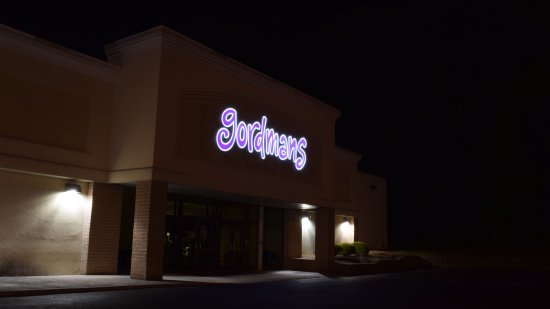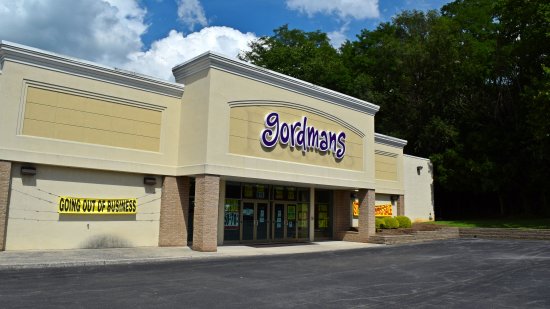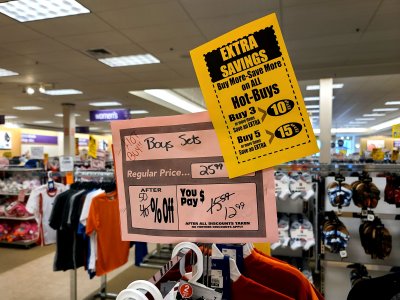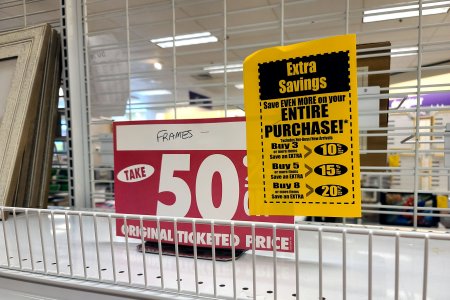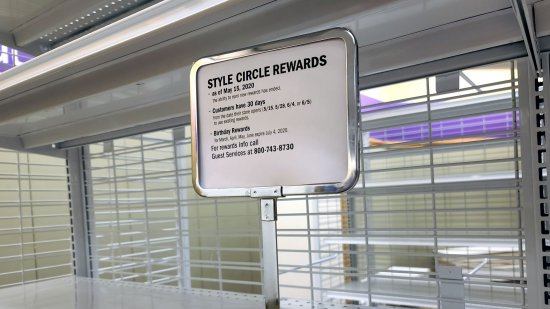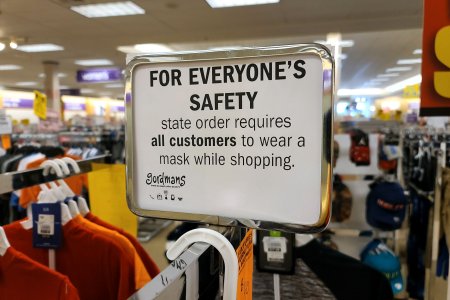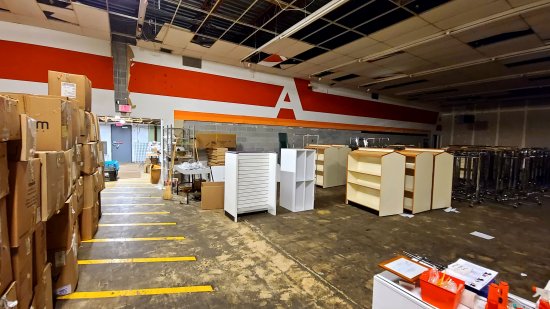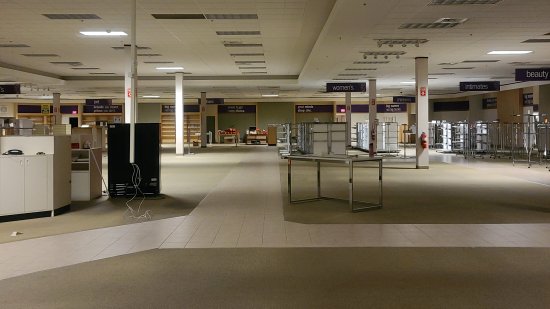Gordmans, we hardly knew ye…
10 minute read
May 7, 2021, 10:03 AM
Recently, while working through my very large backlog of photos, I processed the various photos that I took of the Gordmans store in Waynesboro, Pennsylvania. For those not familiar, Gordmans, in the form that I experienced it, was an off-price retailer owned by Stage Stores. Stage was in the process of implementing a major strategic move, repositioning itself away from department stores and going all-in on the off-price model (like TJ Maxx, Marshalls, or Ross). With that, the company had begun to convert all of its department store nameplates, i.e. Stage, Bealls, Goody’s, Palais Royal, and Peebles, to Gordmans. The goal was to have all of its 738 stores in 42 states converted to the off-price format under the Gordmans name by the end of 2020. The Waynesboro store was originally a Peebles, and was an early conversion to Gordmans.
As you probably guessed based on my wording, world events caused a change in Stage’s plans. With the COVID-19 pandemic, the various “lockdown” orders issued meant that all of Stage’s stores, considered “non-essential” businesses, were shuttered for several months. With the stores closed and the resulting lack of sales for an extended period, this pushed Stage off of a cliff, financially speaking, which lead to their filing for bankruptcy. It was ultimately determined that the best course of action was to wind-up operations, and as such, when the stores reopened, they immediately began going-out-of-business sales.
My first experience with Gordmans was on June 1, 2020. Elyse and I were out doing some photography in the Hagerstown and Waynesboro areas, and happened upon the Gordmans store in the Wayne Heights Mall shopping center, at an hour when it should have been in operation, if not for government orders requiring that it be closed.
So this is Gordmans, frozen in time:
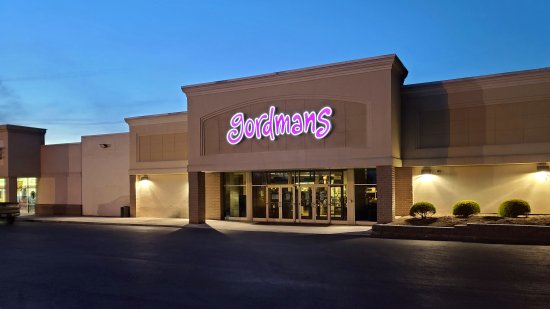
Exterior of Gordmans. Note the Peebles labelscar behind the Gordmans sign.
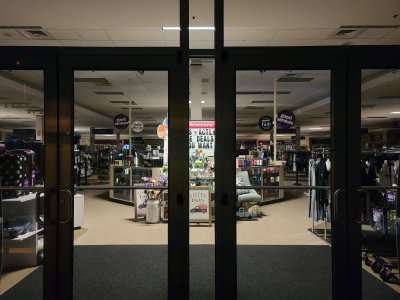
View through the front doors, with an Easter display immediately in front.
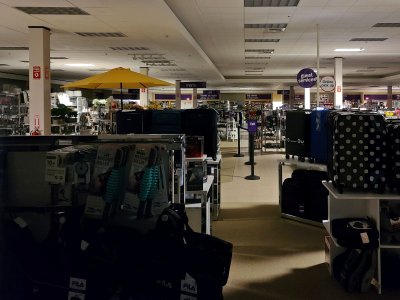
Homelines products on the left side of the store.
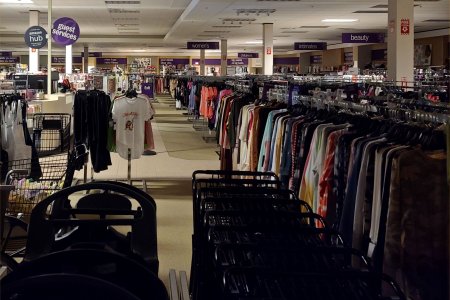
Long racks of clothes on the right side of the store. Long racks of clothes like that are a typical arrangement for an off-price store.
I never visited this particular location when it was Peebles, so I can’t comment on how much things differed from its previous incarnation as Peebles. I also can’t really generalize based on other former Peebles locations, because the Peebles location that I’m most familiar with was the Staunton Mall store, which was a conversion from Stone & Thomas, and didn’t look much like a regular Peebles. But in any case, the location now looked like a typical off-price store, similar to what you would find at TJ Maxx, Marshalls, or Ross.
This visit made me feel a bit sad. The store was frozen in time, stuck in mid-March (its last day of operation was likely March 19) while the world had changed all around it. I also knew that this would be the only time that Elyse and I would ever get to see a Gordmans store whole, appearing the way that the company intended. The company had filed for bankruptcy three weeks prior to our visit, and had announced that the whole company would be liquidated unless they found a buyer. Thus this store was already doomed, but due to closure orders in effect, it was still frozen in time, blissfully unaware of the fate that awaited it.
Elyse and I would visit this location again on August 20. By this time, the store had reopened, and the liquidation sale was underway. So, for the first and last time, we got to see what a Gordmans store was about, albeit in liquidation mode:
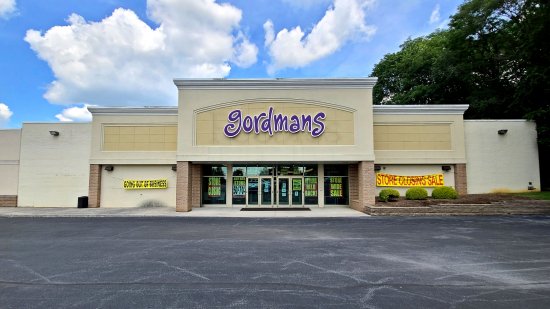
The facade of Gordmans, decked out in store-closing signage.

Straight-on view of the Gordmans logo, with the labelscar from the Peebles sign clearly visible behind it.
At this juncture, it’s worth noting that the logo was my only real criticism of Gordmans. I always felt like the Gordmans logo did a poor job conveying what the store was actually about, and that it didn’t fit the subject matter of the company that it was branding. When I first saw that logo, with its purple color and whimsical font, I assumed that it was a store that catered to girls in their early to mid teens. Gordmans does, in fact, sell stuff for men, as well as people of all ages, but nothing about that logo would pull me in off of the street to get me to check it out. Likewise, I would have never expected a homelines section based on that logo. Teenage girls, for the most part, don’t buy homelines (but their parents probably do). When taken by itself, though, I like the logo. From a design standpoint alone, I think it’s well done. I just find it to be ill-suited for the application that it was being used with. On the right kind of store, that logo would be a killer.
And then I went inside:
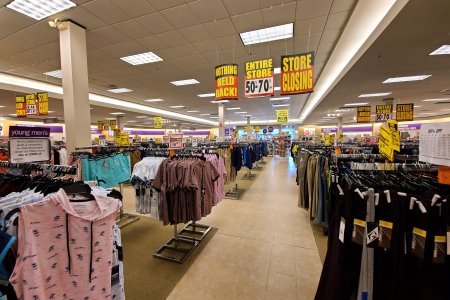
The salesfloor at Gordmans. The middle of the salesfloor contained clothing on freestanding racks similar to a department store, while the side contained the long racks. I couldn’t get a good look at this area in June because other things blocked my view.
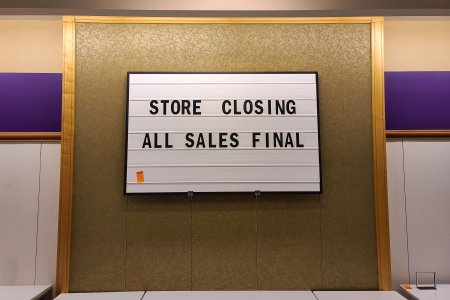
One of several message signs located throughout the store. One is visible in the earlier photo at the entrance, advertising an Easter sale. It made me sad that the message that remained on these signs the longest was “Store Closing, All Sales Final”.
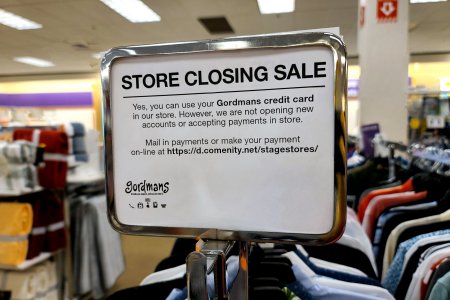
Signage explaining what would happen with Stage’s rewards program and store credit cards.
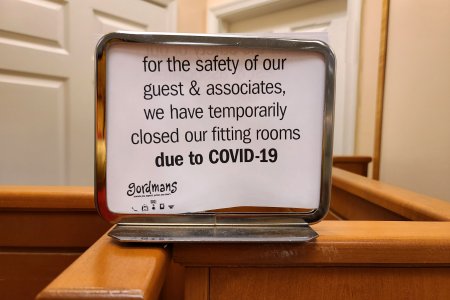
COVID-19 signage at the fitting room. I couldn’t help but think that in this case, “temporarily” really meant “permanently” since the store would soon be gone.
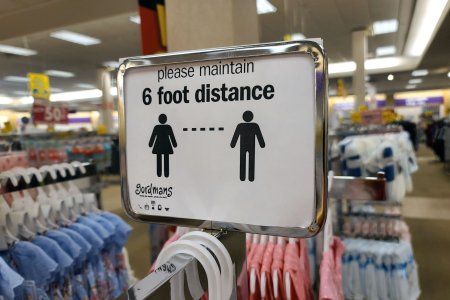
COVID-19 security theater signage around the store.
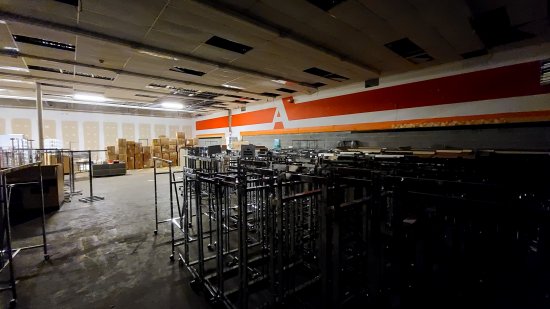
The back room at Gordmans, where the liquidators were selling fixtures. I was surprised about a few things back here. First was that Peebles/Gordmans built additional back room space compared to what was there before. This entire room was part of the salesfloor in the building’s previous form before Peebles. And second, based on that wall design, the previous occupant was an Ames store, which occupied this space as well as what is now Dollar Tree next door. I never would have imagined that such a thing would have been preserved after all of these years.
Amongst the fixtures and such in the back room, Elyse found a Stage board game, presumably used for some sort of training, and wanted to buy it. Unfortunately, the store wouldn’t sell it to us because it had the company’s name on it. We were disappointed, but those are the breaks, I suppose.
So all in all, the Gordmans in Waynesboro, Pennsylvania only got to operate for 31 days, from February 18 to March 19, when government orders shut it down for more than two months. Then when the store was finally allowed to reopen, it went into liquidation. The store operated under the auspices of a liquidation company for more than twice as long as it was operated as Gordmans by the company as a going concern.
And then this is what the place looked like after Gordmans vacated, photographed on November 27, 2020:
Seeing that empty store, I couldn’t help but think, what a waste. Stage was in the process of making a major strategic transformation from department stores to off-price, with promising results from the transformation, with same-store sales up 17%. But then they got kneecapped, and as such, they never got the chance to see how well their strategy would play out in the marketplace. How would Gordmans perform as an off-price retailer under Stage ownership? We will never know, because they never got the chance to put their strategy into practice.
I don’t normally feel badly when businesses fail, and especially so when large companies fall. After all, it’s just business, and failure is a risk that you assume when you go into business. But Stage Stores failed due to circumstances beyond the company’s control. It makes me feel sad for them, as well as angry at the entities whose actions resulted in their failure. Basically, when all of the company’s stores were ordered to shut down for an extended period, the resulting lack of sales caused the company to run out of cash. After all, even while things are closed and most employees are furloughed, rent still needs to be paid, utilities need to be paid, taxes are still due, and so on. In other words, people still have to eat. And companies need a continuous flow of money through them in order to meet these obligations on an ongoing basis. One cannot just hit “pause” on the economy, weather out a rough period, and then resume like nothing ever happened. Even if the business is forced to stop operating, the economy never stops moving. And that’s what makes me angry about this and similar failures: while COVID-19 is most certainly something to be concerned about, it was never the threat to the extent that many governments responded to it as. The response was extremely disproportionate to the severity of the threat, and destroyed far more lives than it saved. In the case of Stage, 19,000 employees lost their jobs with the winding-up of the company, and who knows how many people who had invested in Stage lost their shirts, all through no fault of the company’s. The company was poised for success, after all, but then failed due to circumstances beyond the control of anyone at the company. The measures may have lessened the risk of catching COVID-19 (but probably didn’t in any appreciable way), but instead, many people lost their livelihoods.
What amazed me most, though, was the response from some people, who rationalized pandemic-related business failures like happened to Stage as something of a moral failing on the company’s part, claiming that the company’s failure due to the extended closure was its own fault and therefore deserved to fail because the company did not save for a rainy day. Would “delusional” be the right word to describe such people? After all, prior to March 2020, the idea that a company would be forced to shut down for an extended period by state governments, ostensibly to stop the spread of a virus, would have been considered absurd. Prior to that, the most that one might have seen would have been a closure of a few days for a hurricane or a blizzard or some other natural phenomenon, but then business would quickly resume once the storm cleared. And such a shutdown would not have been companywide. Such a closure would have only affected a few units in a fairly limited geographic area. It would continue to be business as usual for all of the company’s other operating units. That sort of contingency is the sort of thing that companies can and should plan for, as it is reasonable to expect a natural disaster to happen from time to time. However, it would not have been considered reasonable prior to March 2020 to plan for a sudden, extended shutdown of the entire company by government fiat. It had never happened before, and would have been considered unthinkable. Was Stage in the best position, financially speaking, prior to March 2020? Maybe, maybe not. Perhaps they were leveraged a bit more than would otherwise be advised in order to finance their repositioning to off-price, but in that case, I would imagine that they would have been expected to recoup that through increased sales when the repositioning was complete and the newly-minted Gordmans stores were showing results.
I have said in other places in the past that the legacy of the COVID-19 pandemic should be the placement of safeguards to ensure that this sort of overrereaction to a natural phenomenon never happens again. The vast majority of people who caught the disease recovered in two weeks. But the economic devastation that our governments perpetrated against their own citizens will take many years to recover from, and some may never recover from it. So much wasted potential. This is what happens when people become afraid, and act from a place of fear. Mass hysteria is a hell of a drug, and it’s left a large path of destruction in its wake. It would have been one thing if economic shifts as a result of the pandemic had happened naturally and businesses failed because of that, but once the government meddled in such a major way, ordering all of these so-called “non-essential” businesses closed and not providing much in the way of aid to help them weather it, they owned every last bit of it. After all, the virus didn’t shut the businesses down. The virus does not care about such things. The government did that all on its own. And that’s what angers me so much about all of this. Companies like Stage didn’t fail on account of business cycles. Rather, they were artificially starved to death when the government went in and chose winners and losers, and that is never acceptable.
Categories: Companies, COVID-19, Waynesboro (PA)











